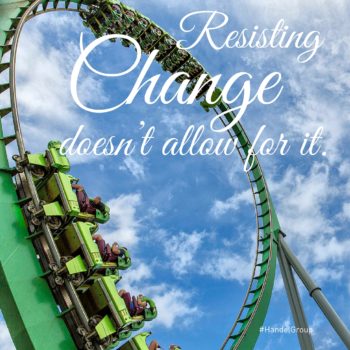Years ago, when I first came to the Handel Group® as a client, I got the whole methodology laid out for me, and I digested it all, chunk by life-changing chunk.
Now, as a Co-President in the company and a Senior Coach, I teach others our method. I thought I knew all there was to know about The Handel Method®, but I recently got “schooled” by an outsider. In a discussion with Dr. James Phills, I got a refreshing new perspective on our method.
Dr. Phills is a Professor of Organizational Behavior (Teaching) at the Stanford Graduate School of Business. In collaboration with our Education Division, he teaches “Leading your Life,” a course integrating the Handel Method®, to Stanford MBA students. What is noteworthy about this course is that it links the Handel Method® to research and theory in several academic disciplines. Here’s an excerpt from what he taught me about the support for the principles underlying the Handel Method® from academic knowledge.
He started with Personal Integrity®, one of the foundational principles of the Handel Method®. Personal Integrity® is the ability to make and keep promises to yourself. “It is a generally recognized that we behave as if there were two parts of ourselves.” At HG, we call them the “brat/chicken” and the “dreamer.” By dreaming and cutting through excuses, we teach people how to empower their dreamer to exercise control over the brat and chicken. We call this process, developing Personal Integrity®. Economist and Nobel Memorial Prize winner, Thomas Schelling, describes this same process, in his writing, as “self command.” You may know it as “self-control” or even “will power.” Regardless, we all agree it is important to align what you do with what you want and what you believe.
Get a feel for how The Handel Method® could benefit you.
Social psychologist, Roy Baumeister and his students, showed through their research that Personal Integrity® is like a muscle. It can be exhausted from overuse, but it can also be strengthened with practice. This strength can transfer into other “domains,” or as we say, areas of life. So if you can eat healthfully and exercise, then you can get that graduate degree, or clutter clear your house, or have a beautiful relationship.
Phills also talked about guilt, something I’ve watched many people inflict upon themselves. Research shows that guilt actually makes it more likely for people to fail after breaking promises to themselves. This succinct, yet powerful observation supports what we know: guilt (or “feeling bad”) is a diversion and it can derail your very ability to succeed in the future. We eliminate guilt from the equation by using consequences to strengthen your ability to keep your promises, and when you don’t, to restore integrity. If you’re a client, then you already know our process of making a promise to yourself and paying a consequence if you break that promise. I’ve been practicing this technique for years now and I can tell you, it works. Consequences are immediate reminders that your actions matter and they halt the “feeling bad” before it begins. Dr. Phills calls the pairing of consequences with promises powerful. Why? “Because it gets rid of guilt.”
If Dr. Phills observes that research already supports the things that we teach, then what’s significant about the Handel Method®? Our method goes past the point where science experiments and theory stops; we provide people with a comprehensive action-oriented framework and teach them how to use it as a way to LIVE. This is what resonates for Dr. Phills. “I became intrigued by understanding, explaining and enhancing the ‘mechanisms of action’ embedded in the Handel Method®.” In other words, he partners with us because we excel at teaching people how to take action and move forward in their own lives.
His class, he explains, is about “exercising leadership over your life.” His MBA students are preparing to lead corporations, institutions, agencies and more. To be the most effective kinds of leaders, Dr. Phills feels, and we agree, that they must also lead their own lives by using the same principles and practices they would use in their organizations. Leading your life as an individual takes the same skill set used to lead others.
We discussed much more about the common ground between the Handel Method and academic research, but I can’t fit it all in here. I am grateful to him for sharing the many ways that the science of psychology adds more legitimacy to our method. If you’re interested in learning more about The Handel Method® and how it might benefit you, Schedule a 30 Min Consultation.
Love, Laurie

